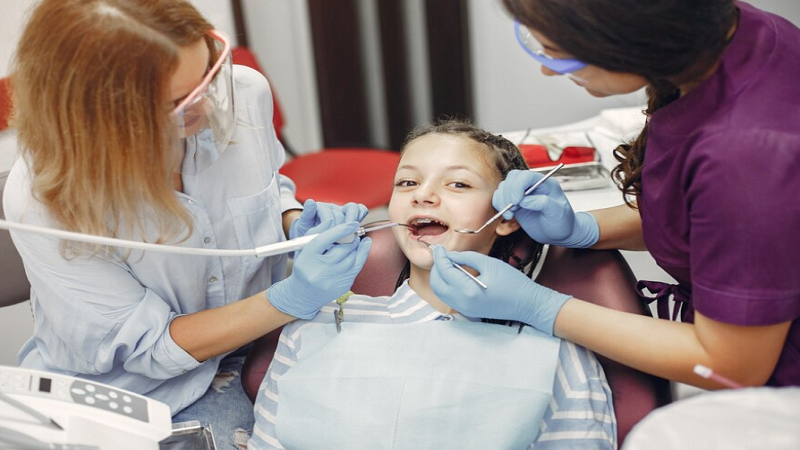Ensuring that children maintain healthy teeth and gums is crucial for their overall well-being. Good dental health not only boosts their confidence but also helps prevent a range of physical health issues.
This article will explore the significance of establishing positive dental habits early on, highlight common dental problems that children face, and offer practical tips for preventing these issues. It will also discuss the importance of regular dental check-ups and provide strategies to make dentist visits a more enjoyable experience for children.
Read on to discover how you can foster bright smiles for your children.
The Importance of Children’s Dental Health
Children’s dental health is essential for their overall well-being and can significantly influence their future health habits. Establishing good oral hygiene from an early age not only promotes healthy smiles but also prevents various oral diseases and conditions, such as tooth decay and gum issues.
Early education about dental care, including regular brushing, flossing, and routine dental check-ups, is crucial in developing lifelong health habits. By ensuring that children understand the importance of maintaining their teeth, parents can lay a solid foundation for healthy oral development.
Impact on Overall Health and Well-being
The impact of children’s dental health goes beyond mere oral hygiene; poor dental care can lead to significant health issues, including tooth decay and gum disease, which can, in turn, affect their overall health and well-being.
Research indicates that these dental problems may contribute to more serious conditions such as cardiovascular disease and diabetes. It is essential to recognize that a healthy diet, rich in fruits, vegetables, and whole grains, not only fosters strong teeth and gums but also supports the immune system, making children less vulnerable to various illnesses.
To maintain good oral hygiene, parents should:
- Promote regular brushing with fluoride toothpaste.
- Encourage flossing.
- Ensure routine dental check-ups.
- Reduce the intake of sugary snacks and beverages to significantly aid in preventing cavities.
By prioritizing dental health, parents can help establish a foundation for their children’s overall health that will benefit them for years to come.
Establishing Good Dental Habits
Establishing good dental habits early in life is essential for children’s long-term oral health. These early practices lay the groundwork for a strong dental care routine that encompasses regular brushing, flossing, and the use of age-appropriate oral care products, such as children’s toothpaste.
Key Habits for Children’s Dental Health
Key habits for maintaining children’s dental health include ensuring proper brushing frequency, implementing effective dental flossing techniques, and focusing on healthy snacks that promote oral hygiene.
To establish robust dental health, parents need to guide their children to brush their teeth at least twice a day, particularly after breakfast and before bedtime. Incorporating dental flossing into either the morning or evening routine is equally vital; this should be performed at least once daily to remove food particles trapped between teeth.
Avoiding sugary snacks and beverages is crucial, as this can significantly reduce the risk of cavities. Instead, prioritize healthy alternatives such as fruits, vegetables, and whole grains. Parents can also model good dental habits and create an engaging routine around brushing, transforming it into an enjoyable experience rather than a chore.
Common Dental Problems in Children
Common dental problems in children, including tooth decay, dental emergencies, mouth sores, and issues such as dental anxiety or tooth sensitivity, can significantly impact their quality of life.
It is essential to address these concerns promptly to ensure their overall well-being and dental health.
Identifying and Addressing Issues
Identifying and addressing dental issues early is essential, and scheduling regular dental check-ups with qualified professionals can facilitate early detection and effective prevention of oral diseases.
These appointments typically involve thorough examinations, professional cleanings, and often X-rays to uncover hidden problems such as cavities, gum disease, or even oral cancer. By being proactive, individuals can address minor issues before they develop into serious complications, potentially saving time, discomfort, and costs in the future.
Preventive care also includes education on proper oral hygiene practices, dietary recommendations, and the importance of fluoride, all critical for maintaining optimal dental health. Regular visits act as a safeguard, enabling individuals to monitor their dental health effectively while fostering a sense of accountability in maintaining a healthy smile.
Preventing Dental Problems
Preventing dental problems requires consistent effort through a comprehensive dental care routine. This includes implementing effective cavity prevention strategies, scheduling regular fluoride treatments, and utilizing dental sealants as needed.
Tips for Maintaining Healthy Teeth and Gums
Maintaining healthy teeth and gums requires the use of appropriate oral care products, monitoring sugar intake, and ensuring that children consume nutritious drinks and snacks as part of their diet.
To promote optimal oral health, parents need to choose the right mouthwash specifically designed for children, ensuring it contains fluoride without harmful additives. Opting for low-sugar beverages can significantly reduce the risk of cavities, with water and milk being the healthiest choices.
Incorporating nutritious snacks, such as crunchy fruits and vegetables, not only supports overall physical health but also naturally cleans teeth while providing essential vitamins and minerals. By establishing these habits early on, parents can set their children up for a lifetime of good dental hygiene.
Visiting the Dentist: When and Why
Visiting the dentist is an essential component of maintaining children’s dental health. Regular dental appointments, beginning with early visits, play a crucial role in effective pediatric dentistry and dental education.
Importance of Regular Dental Check-ups
Regular dental check-ups are essential for monitoring your children’s oral health, evaluating the necessity of dental X-rays, and conducting comprehensive oral examinations to prevent future problems.
These visits facilitate the early detection of cavities, alignment issues, and other developmental concerns that may arise. During an examination, dental professionals will assess the condition of the gums, check for plaque buildup, and evaluate the overall health of each tooth.
Dental X-rays are crucial in this process, as they reveal hidden issues beneath the surface, such as decay or abnormalities that are not visible to the naked eye. This proactive approach not only helps maintain a healthy smile but also reduces the likelihood of requiring more extensive and costly treatments in the future.
Creating a Positive Dental Experience
Creating a positive dental experience is essential for alleviating dental anxiety in children. Employing strategies such as positive reinforcement and familiarizing them with dental tools and mouthguards can significantly enhance their comfort and cooperation during appointments.
Strategies for Making Dental Visits Less Stressful
Implementing effective strategies to make dental visits less stressful can significantly enhance children’s experiences. This can include incorporating a familiar dental care routine and using children’s toothpaste that they enjoy.
Encouraging kids to engage in role-playing can be particularly beneficial, as it allows them to practice what they might encounter during their visits. Reading age-appropriate books that explain dental procedures can help demystify the experience and create a sense of familiarity.
Discussing what to expect during the appointment can alleviate anxiety, preparing them for any sounds and sensations they might encounter. These practical approaches not only reduce fears but also help build a positive association with oral health care, leading to more relaxed visits in the future.




